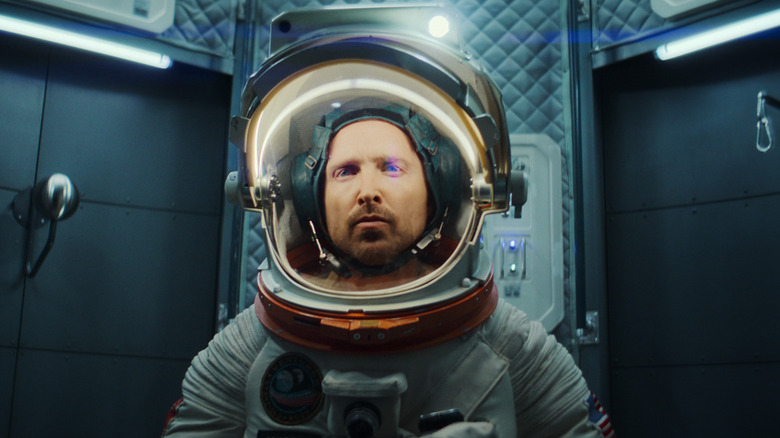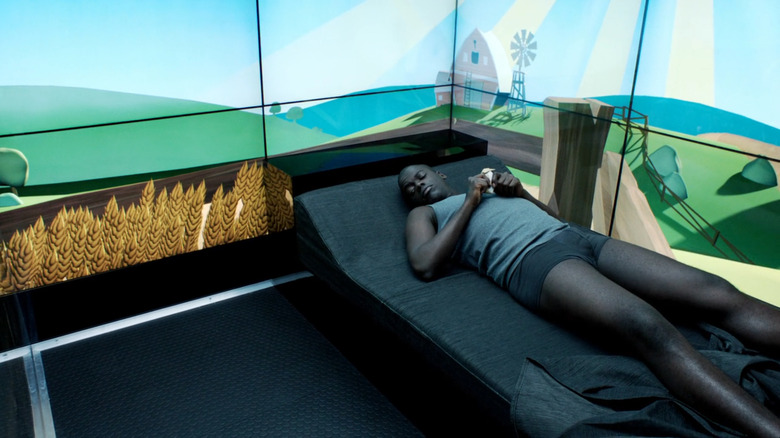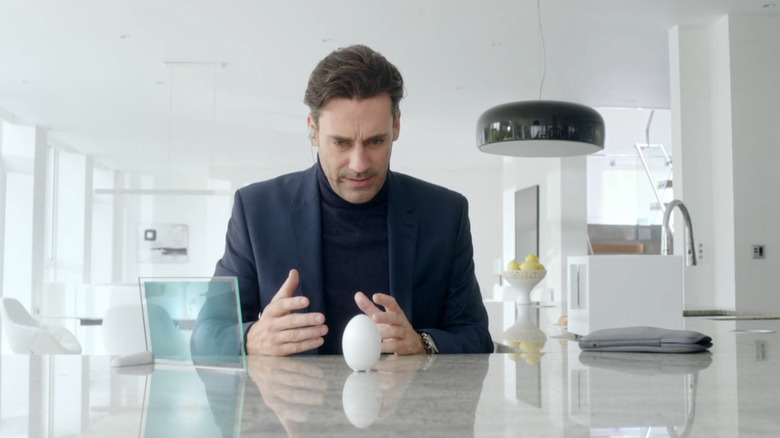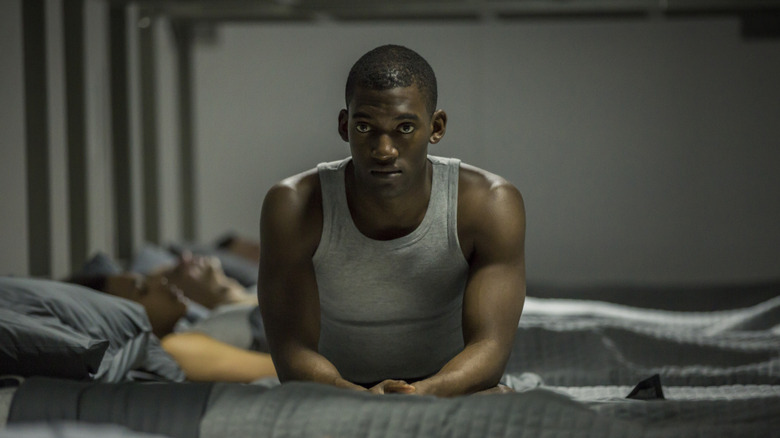Black Mirror Episodes That Freakishly Predicted Technology's Future
"Black Mirror," the horror anthology series by Charlie Brooker, is a look at the dark side of technology and the effects it may have on our lives. For the most part, each episode presents us with a futuristic form of technology, then follows that innovation to its darkest conclusion. While not every episode is a masterpiece, "Black Mirror" is an Easter egg-packed thrill ride that, at its best, does what its title promises, holding up a looking glass to human nature in the form of a digital screen.
Since the first season of the series debuted in 2011, "Black Mirror" has earned comparisons to "The Twilight Zone" for its ability to tell disturbing morality tales that expose what darkness lies beneath the surface of our supposedly civilized society. The series is sometimes accused of being too cynical in its assessment of human nature, but that critique is not always accurate. At its most potent, "Black Mirror" not only highlights the dangers of a particular technology but also points out the incentives that might lead someone to misuse it.
For that reason, "Black Mirror" has sometimes succeeded in predicting technological trends well before they enter the mainstream. So from microtransactions to smart speakers, here are the "Black Mirror" episodes that most accurately predicted the future.
Fifteen Million Merits predicted a world of microtransactions
"Fifteen Million Merits" is "Black Mirror" at its best. The episode stars Daniel Kaluuya as Bing, a man living in a hyper-capitalist dystopia. His life is defined by the number of "merits" he has, points that function as currency and are earned by riding a stationary bike to produce energy. A pearl of toothpaste in the morning costs five merits. Skipping video ads costs more, as does food from the cafeteria.
When Bing tries to free his coworker Abi (Jessica Brown Findlay) from this literal cycle of exploitation by entering her into a talent show, she ends up pressured into an adult film career as an escape from the drudgery of the bikes. When Bing then goes on the show and rants against the system while threatening to slit his own throat, his desperate jeremiad is such a ratings boost that he's given his own TV show, reflecting the way that capitalism subsumes critiques of itself, turning revolutionary sentiment into a consumer product.
On the surface, the episode functions as a razor-sharp critique of capitalism and the ways it objectifies people, transforming them into commodities. But it also takes things a step further, speculating that technology will enable capitalist rent-seeking on an unprecedented scale. Indeed, in the years since "Fifteen Million Merits" aired, we have seen the rise of digital microtransactions.
The trend is most prevalent in video games, where in-game items can be purchased for small amounts of money, but it has spread elsewhere. On Amazon, you can buy things with a single click. We pay monthly fees to access media libraries on Netflix and Spotify but do not own the songs or movies. It may be only a matter of time until we pay for toothpaste by the dollop.
The Entire History of You predicted a world of self-surveillance
In "The Entire History of You," marital infidelity is exposed due to a skull implant called a "grain" that allows users to record everything they see and hear. When Liam (Toby Kebbell) suspects his wife Ffion (Jodie Whittaker) of cheating, he goes on a self-destructive rampage that culminates with him cutting out his implant with a razor blade.
While implant technology is nowhere near being a reality, the episode still got quite a lot right about the future of tech. Two years after it aired, Google announced Google Glass, a headset the size of a pair of glasses with a camera mounted on the front. However, the device was too far ahead of its time. In 2013, the general public clearly wasn't ready for a world where anyone could be recorded at any time. People began to harass and assault Google Glass users in public. One reporter was surrounded in a bar, then had the headset ripped from her face and her purse stolen.
Then, in 2016, billionaire Elon Musk launched a new company, Neuralink, that aimed to make brain implants a reality. So far, the project has gone nowhere, with little to show for its efforts but a whole lot of dead monkeys.
But the constant self-surveillance depicted in "The Entire History of You" has come true in spirit if not in deed. Smartphone cameras continue to get better, and many people meticulously document their lives, amassing their day-to-day doings in Instagram stories and Snapchat archives. We don't need brain implants to obsess over our digitally documented pasts.
White Christmas predicted smart assistants (but took the concept too far)
"White Christmas" is probably the darkest holiday special ever made. Starring Jon Hamm and Rafe Spall as two men stuck in a cabin on Christmas, the twist is that they are trapped in a simulation as punishment for crimes they committed in real life. Hamm's character Matt Trent steals the show as a man whose day job was to program smart home controllers while moonlighting as a virtual coach for romantically inept men. While the latter job definitely reflects some creepy realities of the internet age, Hamm's main job eerily predicted the rise of smart home voice assistants.
The smart home controllers in "White Christmas" are called "cookies," and they work a lot like Amazon's Alexa with one major difference. Instead of a robot, cookies are powered by a copy of the homeowner's consciousness, which is forced to automate the household. Should the copied person refuse, Hamm's character is called in to punish them by altering their sense of time so that one minute of real-time could equate to a thousand years in the cookie, for instance.
Ultimately, though, the cookies depicted in "White Christmas" are unrealistic, not only because transferring human consciousness into a computer remains an impossibility, but because even if it were possible, it would be far more inefficient than current smart home assistants. Who wants an imprisoned version of yourself that must be coaxed and tortured into running your smart home, when you can just have a robot do it without the ethical conundrums and hassle?
Men Against Fire predicted the rise of transphobia fueled by the internet
In "Men Against Fire," the fifth episode of "Black Mirror" Season 3, a soldier called Stripe (Malachi Kirby) is tasked with eradicating mutant humans known as "roaches." But after his military-issued augmented reality implant glitches, he realizes the dark truth. Roaches are not mutants but rather regular humans belonging to a persecuted ethnic minority, and Stripe has been murdering them as part of an ongoing genocide.
The plot of the episode is an allegory for the ways in which people can be misled into hatred of a vulnerable group, and for how technology can accelerate that hatred. We tend to think that we are more evolved than our ancestors due to our technological advancements, but "Men Against Fire" lays bare the truth that technology can be used to inflame our tribalistic prejudices. It can amplify messages of hatred and distort our perception of those who are different from us. Malicious actors can use technology to spread dehumanizing propaganda.
Sure enough, in the years following the episode's release, we have seen that phenomenon play out in real life, as the very existence of transgender people has become the subject of widespread political debate. In the United States, trans people are regularly dehumanized and vilified, falsely labeled as predators. As noted by the Human Rights Campaign, that rhetoric spreads through the internet until it manifests in very real laws, with more anti-trans bills introduced in 2023 in legislatures around the country than at any other point in history.
Most Black Mirror episodes got things completely wrong
While the examples above had predictive power, most "Black Mirror" episodes strayed far from the mark when anticipating technology. The anthology series has always been at its most potent when it takes an aspect of existing tech and follows that thread to the most horrific possible outcome. Unfortunately, Charlie Brooker and company often seem to fundamentally misunderstand the technologies the show addresses.
Take, for instance, the extremely perplexing "Striking Vipers" from Season 5, which stars Anthony Mackie and Yahya Abdul-Mateen II as Danny and Karl, two friends who discover that a VR fighting game can instead be used to have virtual sex with each other while occupying the bodies of their in-game avatars. The problem is that, for such a thing to occur, the game developers would have had to specifically program that in as a feature, a plot hole the episode never addresses. Plenty of other episodes jump the shark in a similar fashion.
That lack of predictive power is perhaps why Season 6 avoided trying to prophesize technological trends, with the first episode, "Joan is Awful," being the notable exception. It follows Joan Tait (Annie Murphy), a woman whose real life is apparently stolen by a Netflix-like streaming service. There is not a single thing the episode gets right about the way technology works, except for how hardly anyone reads the terms of service. Although the episode is implied to take place in the future — the main character's phone has a 7G signal — there is no way for a smartphone to collect the data necessary to pull off such a scheme.
Many other "Black Mirror" episodes miss the mark in a similar fashion. But the prophetic moments some episodes exhibit make the duds well worth it.





